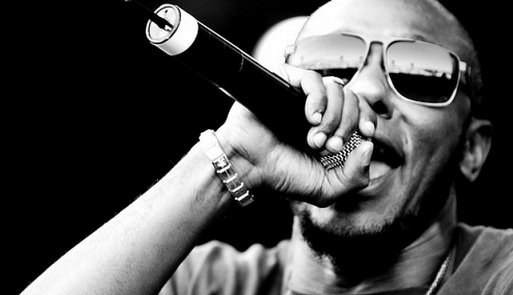TAS Live Review: Mos Def At Highline Ballroom, 2010

Always as prolific as he is charismatic, Mos Def played the Highline Ballroom Sunday, January 17 to promote The Ecstatic, his fourth solo album.
What’s so unique about Mos Def is that he not only makes music with a strong social message - themes of peace, unity and freedom - but that he looks so damn cool doing it. Dapper in yellow suspenders, a classic fedora, brown loafers and a tie, he was hip-hop’s version of Buddy Holly that evening as he crooned into a bright red vintage 50s microphone. You know, Elvis-style.
That same positive spirit seems to permeate every aspect of his being: his demeanor, his collaborations, the diverse fans at his show, on-stage video projections and his mix of impassioned rapping and singing. He’s a performer who is completely engaged with his audience. A film and Broadway actor, he’d break into stories with a sort of projected accent not usually found in a born-and-bred Brooklynite. It could have been unintentional, but he has allegedly finished shooting the upcoming film that follows the life of Haitian revolutionary Toussaint Louverture. Either way, his message rang loud and clear.
Mos Def opened the show by proclaiming “Happy Birthday Mr. Ali!” as archival footage of Muhammad Ali played behind him for the rest of the night. At one point, someone from the audience handed him a Haitian flag. Grateful, he draped it over his face and stood with his arms outstretched, as if embracing not only his fans but every Haitian person as well. He called for a moment of silence, but an audience outburst - a woman who seemed to be yelling at her boyfriend - interrupted it. While most artists would have grown impatient or annoyed, Mos Def displayed the same grace and style he brings to his music, asking everyone to just be cool and talk it out.
For the first half of the show, Mos Def mostly played songs from The Ecstatic, including an early pinnacle, the driving anthem about city life, “Life in Marvelous Times.” He then stepped over to the drums to beat out “Quiet Dog Bite Hard” as he rapped along with minimal accompaniment from DJ Preservation (how often do you see rappers playing their own instruments?).
Although the energy started to wane a bit in the middle, the second Talib Kweli popped out from backstage the room exploded. It wasn’t just the audience; the connection between the two rappers is palpable. They fed off of each other with level of comfort that can only come from a longtime friendship and collaboration on Black Star tracks “History,” “Respiration,” and “Africa Dream.” Then Jay Electronica entered the scene and launched into the energetic “Exhibit A (Transformations),” a song that references, to name a few, Etta James, Kurt Vonnegut, Kurt Cobain and Coretta Scott King.
At the height of the excitement, Jay Electronica cued Billy Stewart’s soulful 60s ballad “Cross My Heart," the opening sample of the collaborative “Exhibit C,” but almost instantly waved off the DJ.
“The guy who actually does this next part,” Mos Def explained, “is here tonight.” He walked to the side of the stage and pulled up none other than Diddy himself. It was obvious that this moment was completely unplanned; Diddy looked surprised, but happy to oblige.
“When you ever seen all us together at once?” Jay Electronica said as he crowned Diddy with his red fez and signaled the DJ again. The entire room just erupted.
Mid-chorus, the fifteen people now on stage led everyone in chants of “we love Haiti.” Everyone was smiling and hugging each other. It bordered on a kind of "adorable" you wouldn’t expect to find at a rap show. Both crowd and performers were – for lack of a better word – ecstatic.

